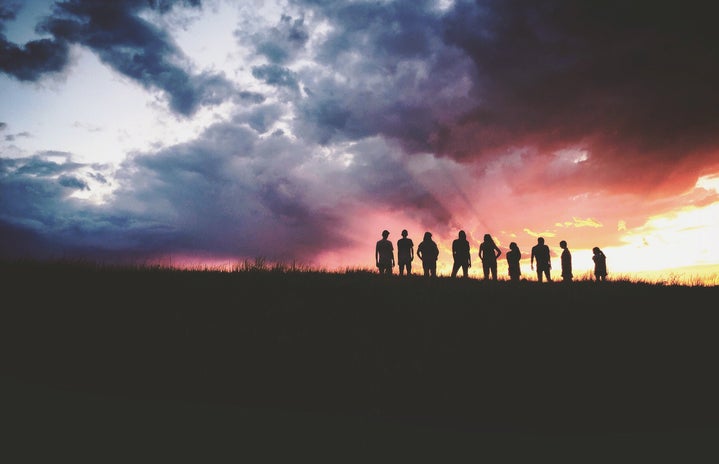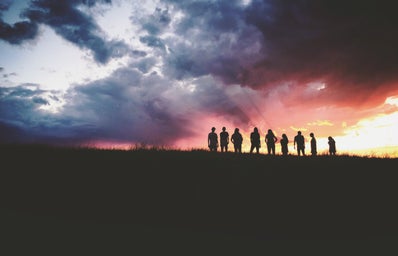I realized something was wrong the day I found myself chasing after my father in a bookstore but he kept walking away, refusing to make eye contact, ignoring my repeated calls.
I could understand why. Having an insistent fifteen-year-old running after you with about half a dozen book requests while you’re trying to browse the latest bestsellers in peace is rather annoying.
But finally, my father shut his book and gave me a hard look. I knew then that what he was going to say wasn’t about to be pleasant.
“I’m not your father,” he informed me.
I stared at him. I was being irritating, sure, but to disown me for that seemed a little extreme.
Suddenly I heard my name being called. I spun around to see my real father frantically gesturing and calling my name, perplexed and concerned by why I was stalking a total stranger. That’s when I realized I had a problem.
Prosopagnosia or ‘Face Blindness’ refers to a condition in which individuals like me find themselves unable to recognize most people’s faces, including those of close family members or even themselves for reasons that may be related to injury, disease, or genetic abnormality. As a result, the statement “everyone looks the same to me” becomes a frightening reality to live in, and one that I know well. I’ve always admitted that I was bad with facial recognition and recall but for a number of years, it was assumed to be either out of laziness or lack of interest. After coming across the disorder and realizing its symptoms matched me completely, I learned that I wasn’t really looking at people’s faces to recognize them (because I can’t), but using elements such as their clothing, hair texture, skin color, physical size, voice, shoes, or unique marks and attributes alongside a process of elimination at any given time and place to solve for the identity of the person in front of me. This sounds logical, but comes with problems of its own; I am helpless if the person I know decides to color their hair or takes off their glasses the next time we meet and I have no idea with whom I’m speaking to until they confirm their name. When I imagine a person in my mind, I don’t automatically “see” their face, but bring up an image of them instead, such as one from their social media or a scene in which I met them last and compare their physical features of then with what they have now to make sure I’m addressing the right person. This leads to its own set of social disasters, where I have greeted and spoken to complete strangers in the certainty they were friends, or ignored and glared at people I already know because I mistook them for staring strangers. I’ve done this to schoolteachers in grocery stores and old classmates at the mall. I’ve also nearly abandoned my family and friends on more than one occasion to run after total strangers, even as an adult.
Via Unsplash
The worst for me is the everyday “hallway encounter” where a person and I pass each other on campus within the space of 3-5 seconds and I have the distinct feeling that I must know the person gazing meaningfully into my eyes but I truly have no clue and in the end, move past without acknowledging them. The realization usually comes hours to days later, in which case I message the person and express my apologies but for the most part, I’m completely ignorant. Several friendships of mine have ended over this, since I’m unable to address the miscommunication and the other party feels it’s less embarrassing to withdraw than start a confrontation. Strangely, the people who have confronted me over this are some of my closest friends today, because the quick “Hey, I saw you yesterday but you completely ignored me!” accusation gives me the opportunity to solve the mystery and apologize to them before explaining my position. I can to some extent recognize famous celebrities on billboards if they don’t change trademark parts of their appearance such as plumped up lips or makeup or thick brows but even then I use an image of them I saw last to hold it against their present form before making the final confirmation.
In Japan, a country where clothing and fashion trends are highly standardized and there’s less diversity in terms of skin and hair color as compared to my home country of India, this becomes highly stressful for me since distinct markers such as “dark brown skin” and “waist-length curly hair” and “florescent pink shoelaces” and “orange lipstick” and “small tattoo on wrist” are examples of the kinds of things I rely on most to put a name to the face before me. In Tokyo, where the black business suit, professional hairstyles, natural makeup, contact lenses, and UNIQLO jackets abound, I’ve made plenty of horrifying mistakes.
“Umm, sorry, would you happen to be Tanaka-san?”
“No. Who is that? I’m Megumi. From your club?”
Which makes the listener think I’m a racist who believes all Japanese people look the same.
Face Blindness affects me more indirectly in a number of other ways. For example, I’m positively allergic to movies with more than 3 central characters because there’s no way I can keep track of all the people running around the scenes of something such as Ocean’s 11. I naturally gravitated towards anime because the characters’ wild and funky hairstyles and surreal eye colors were easier for me to decode. Documentaries are hell, because I completely forget the expert once they leave the screen and ten minutes later prepare to be introduced to them again. Interestingly, Face Blindness makes me a vocal supporter of greater diversity in media because the overwhelming majority of one category of people literally makes it impossible for me to connect with the material.
In school art and photography classes, I unconsciously avoided portraiture like the plague and stuck to landscapes. Looking through my sketchbooks, projects, and comparing them to my classmates’, I realized that when I had to draw people, I left their faces blank in an almost abstract style or cut them out completely. In art museums and galleries, I’m bored by pictures of people because I know I’ll have forgotten them by the time I leave the place, but can stand in front of a scenery for hours.
Face Blindness also applies to my own face. I once picked up a picture of myself as a baby and held it up.
“What a hideous child I was,” I announced to the whole room of relatives, “really, how did anyone love this thing?”
A deathly silence fell over the gathering. Turns out, I was holding up a photo of a relative present right there. Needless to say, I generally keep my mouth shut during large family events and wait for the nightmare to end.
Wondering if I should publish this article publicly or not, darker aspects came to mind. An inability to recognize faces means that in case of a crime, I would be considered an unreliable witness and one whose testimony would be unlikely to convince many since I wouldn’t even be able to pick the criminal I saw out of a line-up of others. Parents with face blindness have admitted to being unable to recognize their own children at school or worse, accidentally picking up the wrong one while the real child watches.
I use a number of coping mechanisms; I take a few second to try and ‘memorize’ a person’s face so to speak for the next time we meet but this has the danger of making me come off as an intense starer. I sometimes require an image or for the person I’m meeting to tell me what color shirt they’re wearing. Finding people at train stations and airports is naturally a nerve-wracking experience and I need photos for help. I’ve also been told that I’m excessively polite and reserved even in my communication and I think this caution is a result of all the discourtesies I’ve inadvertently caused in the past, positively petrified by the thought of having someone think I was scorning them.
I’m writing this in the hopes that there might others for whom these experiences hold true, and to also formally communicate the reality of my condition to those around me whom I may have insulted or hurt on multiple occasions through the course of our interactions. I promise that (on most occasions) I didn’t mean to do so.
The takeaway is this: if you ever see me squinting at you, hesitant as to whether to say hi or not, racking my brains to place your face, please feel free to remind me of whom you are and start the conversation (if you like). I assure you, I will only be more than happy to respond.
Via Unsplash
Further reading:
BBC’s article on Face Blindness with an online test
The Guardian’s article on Face Blindness
Science Friday’s article on Face Blindness

